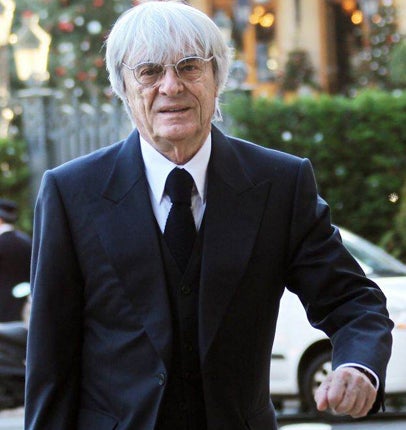Meddling millionaires pose greatest threat to Rangers' continued rise
Warnock's bread-and-butter approach may be at risk, says Glenn Moore

Your support helps us to tell the story
From reproductive rights to climate change to Big Tech, The Independent is on the ground when the story is developing. Whether it's investigating the financials of Elon Musk's pro-Trump PAC or producing our latest documentary, 'The A Word', which shines a light on the American women fighting for reproductive rights, we know how important it is to parse out the facts from the messaging.
At such a critical moment in US history, we need reporters on the ground. Your donation allows us to keep sending journalists to speak to both sides of the story.
The Independent is trusted by Americans across the entire political spectrum. And unlike many other quality news outlets, we choose not to lock Americans out of our reporting and analysis with paywalls. We believe quality journalism should be available to everyone, paid for by those who can afford it.
Your support makes all the difference.When the millionaires arrived at Loftus Road in 2007 the expectation was that Bernie Ecclestone, Flavio Briatore and Lakshmi Mittal would fund a Roman Abramovich-style spending spree to return QPR to the Premier League. With the list of likely recruits headed by such luminaries as Zinedine Zidane and Luis Figo, Rangers fans dreamed of challenging their moneyed west London rivals instead of flirting with bankruptcy.
It did not quite work out like that. There were some exotic imports, but no one of the first rank. More significantly the club was ridden with instability as managers were hired, fired, or quit. Briatore, the F1 and clothing magnate, was strongly suspected of, at best, being behind the managerial carousel, at worst of trying to pick the team. Cash had been spent on bringing the corporate facilities upmarket, but at a price, with some sizeable ticket-price increases. The dream was, for QPR fans, turning sour.
Then in March 2010, with the Indian influence at the club growing, QPR hired Neil Warnock whose promotion bid at Crystal Palace had been derailed by administration. Warnock was the club's seventh manager in less than three years (not including five caretakers). Warnock inherited a squad drifting into relegation trouble and so heavily staffed with loanees the club would have been fined for fielding too many in his first game had not one of them, Marcus Bent, pointed this out to Warnock when the team-sheet went up. By the end of the season 37 players had been used in 46 league games.
Warnock steered QPR to mid-table safety then rebuilt the squad. All the loanees were sent back except Adel Taarabt, who was signed for £1.5m from Tottenham. Eight further players were signed including Tommy Smith and Rob Hulse for £1m fees. In addition Heidar Helguson returned from a loan at Watford and Kyle Walker was borrowed from Spurs. The total outlay was about £5m, akin to Middlesbrough's.
This XI has formed the bulk of Warnock's promotion-winning team. Hulse, restricted by injury, has begun only 12 matches but the rest have all started at least 20. Indeed, of 14 players who have started at least 20 matches, only three were not signed by Warnock.
The trio who have spent most time on the park are the men who best represent the manager on the pitch: Paddy Kenny, Clint Hill and Shaun Derry. All had played under Warnock before, Kenny at Sheffield United, Hill at Crystal Palace, Derry at both. They are what Warnock calls his "bread-and-butter players" and their hard-nosed experience has provided Rangers with a spine that had been absent. They provide the platform for Taarabt, the division's most talented player, to shine. Alejandro Faurlin, who came to wider notice when the club was charged with transfer irregularities, has also made a significant impact playing alongside Derry in a 4-2-3-1 formation.
Rangers have spent the entire season in the promotion places. Beginning the campaign with three straight victories in which they scored nine goals without reply, they were unbeaten until their 20th match. Having been briefly headed by Cardiff City in late autumn, they gradually pulled clear. Neither the loss of Jamie Mackie, whose early burst of goals had won him a Scotland cap, to a bad leg break in January, nor Walker's return to the top flight, discomfited them. Warnock loaned Wayne Routledge from Newcastle, who had bought him from Loftus Road a year earlier, and the winger provided timely impetus, linking well with Taarabt and scoring important goals.
Rangers hope to make Routledge's move permanent in what is likely to be the first of a raft of signings, assuming they are ultimately promoted. Warnock is likely to replace most of a back four which lacks pace, and is likely to be in the market for a new central striker as neither Helguson, 33, nor Hulse, 31, are likely to be able to do the front-running and goalscoring required in the top flight.
The summer's big issue will be what sort of players are signed. Warnock has mellowed enough to incorporate players like Taarabt, whose sloth would have seen him omitted in Warnock's younger days, but he generally prefers experienced British players who put in a shift.
Success appears to have rekindled Briatore's enthusiasm and there are signs he wishes to become more hands-on again (though no longer a shareholder, he is influential on football matters). That may well mean a desire for marquee signings, even a more famous manager – Briatore was quoted earlier this season saying he'd like to appoint Marcello Lippi.
It has not escaped the notice of QPR fans that success and stability have come with Briatore in the background. Their fate next season may depend on how the uncertainty about the club's ownership – Ecclestone has hinted at selling his 62 per cent stake – is resolved.
Join our commenting forum
Join thought-provoking conversations, follow other Independent readers and see their replies
Comments